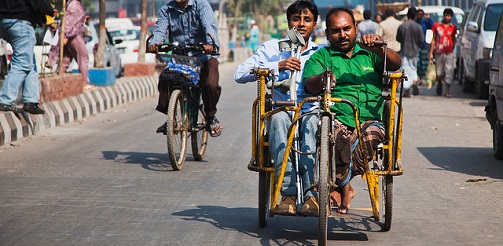The UK Department for International Development (DFID) Secretary of State Penny Mordaunt MP has announced a range of new initiatives to help improve the economic opportunities as well as health and education outcomes for people with disabilities living in low and middle-income countries.

In response to the announcement at the summit co-hosted by the UK Department for International Development (DFID), the International Disability Alliance and the Government of Kenya, Mary Wickenden, IDS Research Fellow said:
“These new initiatives can hopefully bring about a step change in how people with disabilities are included and shape the critical decisions that affect their lives, and their rights and needs as citizens fully recognised.
The programmes will help ensure that the life chances of disabled people in countries including Bangladesh, Kenya, Lebanon, Nepal Nigeria, Tanzania and Uganda are equal to everyone else in their communities.”
UK Aid Connect and Disability Inclusive Development (DID) programmes
IDS is a member of the DFID-funded consortiums that will manage the UK Aid Connect and Disability Inclusive Development (DID) programmes that are being led by Sightsavers. Other consortium members on the UK Aid Connect programme include the International Disability Alliance and ADD International, and partners include Standard Chartered Bank, Youth Career Initiative, BBC Media Action, Development Initiatives, Benetech and Humanity and Inclusion UK. The consortium will focus on generating grassroots evidence; academic, analytical expertise in gender, poverty, participation and exclusion; and private sector know-how and commitment to investing in and employing people with disabilities.
DID partners include International Disability Alliance, ADD International, BBC Media Action, BRAC, Humanity & Inclusion, Leonard Cheshire Disability, Light for the World, Sense International and Social Development Direct. The programme will seek to achieve long-term improved wellbeing and inclusion for people with disabilities in low and middle-income countries, through increased equitable access to quality health services and health outcomes, increased equitable access to quality education and educational attainment, and increased equitable access to jobs/self-employment and improved livelihoods.
The programmes form part of a broader area of work around participation, inclusion and social change at IDS.
Other resources on disability and development
Disability and sexual and reproductive health rights
A new IDS briefing relating to inclusive education and dignity and respect for all is on Sexual and Reproductive Health Rights of Persons with Disabilities by IDS research fellow Pauline Oosterhoff, who recently presented this work to the APPG on Population, Development and Reproductive Health at the UK Houses of Parliament.
Disability and humanitarian contexts
Other recent IDS research on disability has been undertaken on disability inclusion in humanitarian contexts, through the Humanitarian Learning Centre, including the operational practice paper Disability Inclusive Humanitarian Response.
Disability stigma
Under the Knowledge, Evidence and Learning for Development Programme (K4D), funded by DFID and led by IDS, researchers have published reports on Disability Stigma in Developing Countries and also Mobile Technology and Inclusion of Persons with Disabilities.
Maternal health rights for women with disabilities
Through the Future Health Systems Consortium, the Makere University School of Public Health is undertaking a Community Score Cards Study in Uganda on how maternal and newborn health services can be improved for disabled mothers. The What About Us video highlights the challenges that women with disabilities face when seeking maternal health services in the Eastern Ugandan district of Kibuku.
